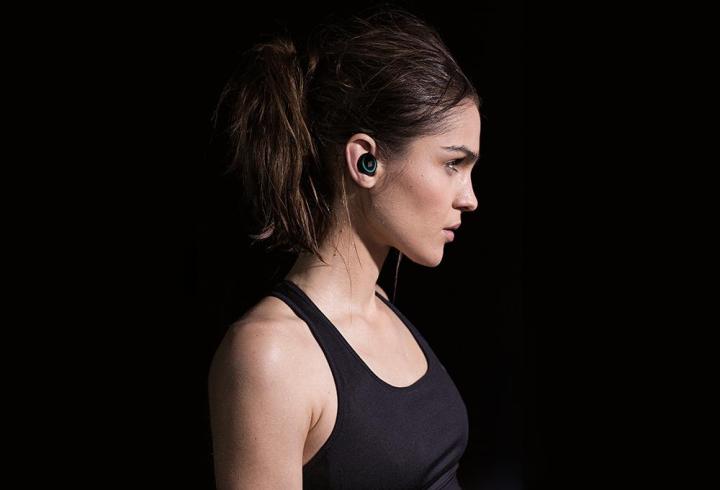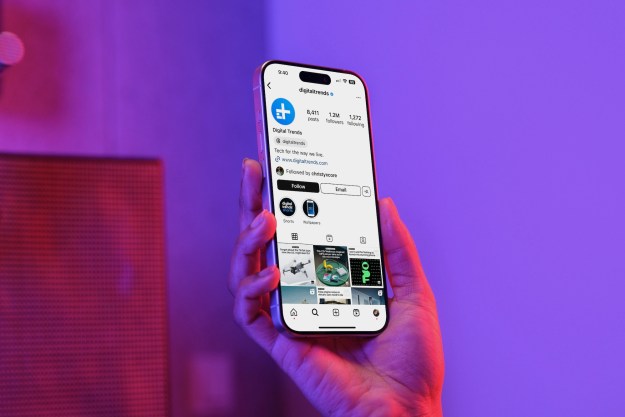
Arm-based accessories aren’t the only gadgets that can make a serious impact on your daily burn, however. As wireless technologies like Bluetooth have grown, “smart” earbuds have begun to pop up on the market, offering a unique — and potentially game-changing — opportunity for fitness enthusiasts to ditch some of their fancy wearables and streamline their experience. These “hearables,” from which there are now several to choose, offer much the same functionality as a FitBit or a FuelBand for approximately the same price — plus they’re cool
Bragi Dash |
Samsung Gear IconX |
|
| Dimensions | Unlisted | 18.9 x 26.4 x 26.0 (mm) |
| Weight | 13.8 grams | Unlisted |
| Sensors | Heart rate monitor, accelerometer, gyroscope, optical touch sensor, magnetometer, & more | Heart rate monitor, accelerometer, capacitive touch sensor |
| Microphone | Bone conduction microphone | Ambient sound microphones |
| Storage | 4GB internal flash storage | 4GB internal flash storage |
| Battery | 100mAh lithium polymer battery | 47mAh earbud battery; 315mAh charging case battery |
| Battery life | Approximately 3 hours | 1-3 hours depending on usage |
| Connectivity | Bluetooth 4.0 + LE, nearfield magnetic induction | Bluetooth 4.1 |
| Audio formats | MP3, AAC, & SBC codec when streaming | MP3, M4A, AAC, WAV, WMA(v9) |
| Compatibility | iPhone 4s+, iPad 3rd gen+, iPod touch 5th gen+, Android 4.3+, Windows 10 mobile limited support | Android 4.4+ |
| Waterproofing | IP55 certified; waterproof up to 1m | Splash resistant P2i nano coating |
| Battery | 100mAh lithium polymer battery | 47mAh earbud battery; 315mAh charginc case battery |
| Price | $299 | $199 |
| Available from | Amazon | Newegg |
| Review | 2½ out of 5 stars | Hands-on |
Design

Make no mistake — these are both handsome sets of ear candy. Unsurprisingly, they both come in alluring shades of black and white, and the IconX are set to release with a blue colorway as well. They both provide a comfortable fit, too. The IconX come in three different sizes to accommodate most individuals, and the Dash come with an array of different FitSleeves, which stretch over the earpieces to fit nearly any ear canal. Both pairs of earbuds also feature external sensors that lend them a futuristic look, and the touch-sensitive faces are both low-key and high-tech.
The similarities don’t end there. Both the Dash and the IconX come with unique cases that double as chargers. The Dash’s metal oyster-shell case feels like something that might house a silenced pistol in a Hitman film, while Samsung’s housing for the IconX — a rounded plastic affair — feels a little more like the charging cases we’ve come to expect from our wearables. Both cases promise to provide several hours of extra use, though Bragi’s holds around five full charges and Samsung’s is closer to three.
From a design standpoint, there really aren’t a ton of differences between the Dash and the IconX. The true differences start with the electronic guts within each of these earphones.
Winner: Tie.
Features and functionality

Each of the Dash earphones house 23 (!) microscopic sensors, from gyroscopes to microphones to heart rate monitors. Bragi designed the Dash with runners, swimmers, and cyclists in mind, and you can cycle through the workout modes by using the touchpads that are located directly on the earbuds. Many of these sensors currently serve fairly benign purposes, however. Though the Bragi app stores various workout information pertaining to your heart rate info and distance traveled — along with a little voice in your ear that will update you periodically over the course of your workout — there isn’t really anything you can do with the data at this point.
The right Dash earbud uses Bluetooth to connect to your mobile device, and the earbuds connect to one another using NMI (nearfield magnetic induction), which is the same type of technology that’s built into modern hearing aids. If this sounds cool, that’s because it is — but, unfortunately, our reviewer found that the Bluetooth signals are generally weak in the first place. That means if you’re using the earphones independently with MP3 files you’ve uploaded (more on that later), the Dash should work perfectly. But connecting them to your phone or iPod can result in a spotty connection and an overall frustrating experience.
Bragi also built the Dash with a native bone conduction microphone. Unfortunately, it’s another area where the Dash struggles, as our reviewer found that it’s nearly impossible to make — or answer — phone calls clearly with the Dash, especially outside or at the gym where ambient noise is everywhere. Given that those are the situations that most people would be buying these earphones for, it’s not great news.
Luckily, the Dash come outfitted with more microphones designed to filter ambient noise out — or in. Transparency mode, activated with a quick swipe left or right across the left earbud, allows ambient noise to filter in on top of whatever’s playing. This is useful for, say, crossing a busy street, or for having a conversation with that neighbor that won’t leave you alone while you’re running. It’s a cool, convenient way to avoid the risk that comes with taking one of these expensive earbuds out while exercising.
All of this is extremely awesome, except for one thing: it only seems to work half the time. The touch sensors on the surface of the Dash are difficult to operate and a little temperamental, especially with sweaty hands. To add insult to injury, our reviewer had consistent trouble with the Bluetooth connection as well, which renders the “track workouts” feature completely useless. The in-ear companion will still give you data about your workout, but it’ll just vanish into thin air afterwards.

The IconX, on the other hand, are equipped with less sensors, but built with more purpose. The biggest difference between the two sets of headphones is the in-ear coach that Samsung built for the IconX. Using the app, you can set goals for workouts — as well as view the same type of data collected by the Dash — and activate or deactivate the integrated “coach” whenever you see fit. The coach will tell you if you need to step your game up to reach your goals, as well as supply you with periodic updates like the Dash. It seems like a feature that true fitness buffs, who appear to be the target market for both sets of earphones, will appreciate.
The IconX uses the same type of touch commands as the Dash, though we haven’t spent enough time in the field to know if they’ll work better with sweaty fingers. Samsung didn’t bother with a voice microphone here, though “Ambient noise mode” is basically the exact same thing as Transparency Mode on the Dash.
Both sets of headphones feature 4GB of flash storage, so you can upload audio files directly onto the
Both headphones provide relatively high-quality audio, considering the slew of other features and the price point. The Dash, especially, deliver solid fidelity with dual armature drivers.
Winner: Samsung Gear IconX
Availability, compatibility, and price

The Dash are built to work together with pretty much any high-end smartphone. Androids running 4.3 or above will connect, as will select Windows 10 devices and basically any iOS device from Apple. Samsung, as one of Apple’s biggest competitors, built the IconX to work with Android devices only — and they must be running Android 4.4 or above.
If you’re dead-set on buying one of these pairs of smart earphones right now, you’ll want to head to Amazon or Bragi and snag the Dash, currently priced at $299. The Gear IconX is set for a Q3 release, which means we’ll see these bad boys hit the shelves somewhere between July and September. Upon release, Samsung will be asking $199 for the IconX.
When there’s not a lot of functionality to differentiate two competing items, a significant price gap can make all the difference. Given the IconX will be priced $100 lower than Braggie Dash upon release, it will have a sizable head start over the Dash directly out of the gates. That said, there are a lot of iPhone owners out there who might want a set of smart earphones, and Samsung’s Android-exclusive IconX won’t make the cut for those folks.
Winner: Tie.
Winner: Samsung Gear IconX

There’s not a lot separating the Bragi Dash from the Samsung Gear IconX, whether you look at design or functionality. These smart earphones do a lot of the same things, and it’s hard to pick an overall winner — especially when we haven’t spent much time with the IconX yet. Though it’s tempting to slight the Dash for its issues with connectivity and touch recognition, Bragi deserves praise for building a one-of-a-kind earphone — until the IconX comes out, at least — that connects with both Android and Apple devices. Samsung isn’t really breaking any new ground with the IconX, which looks quite a lot like the Dash in the first place.
Price is always a concern, though. For $100 cheaper, it would have been reasonable to expect a slightly shorter list of features from the IconX. Instead, Samsung is poised to deliver all the functionality (and sleek design) of the Bragi Dash, but for considerably less dough. That’s enough to earn a slim victory in our eyes.

